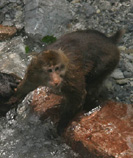|
 The
Tibetan Macaque is found in mixed subtropical forests at altitudes
from 800 to 2,500 m above sea level from eastern Tibet east to Guangdong
and north to Shaanxi in China. this largest species of macaque is
one of the largest monkeys found in Asia. Males are the larger sex,
commonly attain a weight of 13 to 19.5 kg while females weigh 9
to 13 kg. Their long, dense fur is brown on the back with creamy-buff
to grey coloration on the underparts. Some adults are quite dark
brown on the back while others are basically a sandy yellowish brown
color. They have a prominent, pale-buff beard and long whiskers,
but have a hairless face. The infants have silver and black fur
that changes to its adult color at the age of two. They live in
mixed sex groups and have a complex social system; females remain
for life in their natal group, but males disperse shortly after
their adolescence (at about 8 years old). Alpha males dominate the
group, being those that are typically large, strong and newly mature.
As they age, males tend to gradually lose their social standing
and are frequently subject to challenges for dominance from other
males. Females first breed at around five years of age. The gestation
period is six months with a single offspring being produced at each
pregnancy. Males of the group may also be involved in alloparenting
care. They spend most of their time on the ground, where they forage
for leaves, fruit, grass and, to a lesser extent, flowers, seeds,
roots and insects. When available, bamboo shoots, fruits and leaves
are particularly favoured. Their main threats are all human-related.
They are sensitive to habitat destruction, as they are tied closely
to the forest. As well, they are occasionally poisoned by herbicides
and pesticides while eating and may catch diseases transmitted from
human. Illegal poaching may occur, with humans killing them for
their flesh and fur. The
Tibetan Macaque is found in mixed subtropical forests at altitudes
from 800 to 2,500 m above sea level from eastern Tibet east to Guangdong
and north to Shaanxi in China. this largest species of macaque is
one of the largest monkeys found in Asia. Males are the larger sex,
commonly attain a weight of 13 to 19.5 kg while females weigh 9
to 13 kg. Their long, dense fur is brown on the back with creamy-buff
to grey coloration on the underparts. Some adults are quite dark
brown on the back while others are basically a sandy yellowish brown
color. They have a prominent, pale-buff beard and long whiskers,
but have a hairless face. The infants have silver and black fur
that changes to its adult color at the age of two. They live in
mixed sex groups and have a complex social system; females remain
for life in their natal group, but males disperse shortly after
their adolescence (at about 8 years old). Alpha males dominate the
group, being those that are typically large, strong and newly mature.
As they age, males tend to gradually lose their social standing
and are frequently subject to challenges for dominance from other
males. Females first breed at around five years of age. The gestation
period is six months with a single offspring being produced at each
pregnancy. Males of the group may also be involved in alloparenting
care. They spend most of their time on the ground, where they forage
for leaves, fruit, grass and, to a lesser extent, flowers, seeds,
roots and insects. When available, bamboo shoots, fruits and leaves
are particularly favoured. Their main threats are all human-related.
They are sensitive to habitat destruction, as they are tied closely
to the forest. As well, they are occasionally poisoned by herbicides
and pesticides while eating and may catch diseases transmitted from
human. Illegal poaching may occur, with humans killing them for
their flesh and fur.
|
 The
Tibetan Macaque - Issue Twenty-Three
The
Tibetan Macaque - Issue Twenty-Three